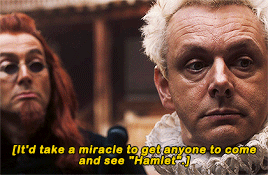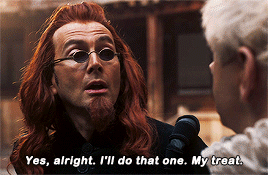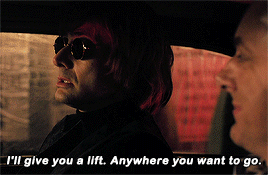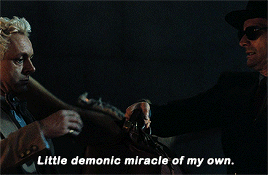Folks Let Me Talk About Crowley And Sunglasses, Because I Have A Lot Of Emotions About When He Wears

Folks let me talk about Crowley and sunglasses, because I have a lot of emotions about when he wears them and when he doesn’t, and Hiding versus Being Seen.
We’re introduced to the concept of Crowley wearing glasses even before we’re introduced to Crowley, by Hastur: “If you ask me he’s been up here too long. Gone native. Enjoying himself too much. Wearing sunglasses even when he doesn’t need them.”
Honestly Crowley’s whole introduction is a fantastic; we learn so much about his character in a tiny amount of time. The fact that he’s late, the Queen playing as the Bentley approaches, the “Hi, guys” in response to Hastur and Ligur’s “Hail Satan”. I like this intro much better than the one originally scripted with the rats at the phone company, but I digress.
Crowley wears sunglasses when he doesn’t need them. Specifically, he still wears them around the demons, and when he’s in hell.

You know where Crowley doesn’t wear glasses? At home.

We never once see him wearing glasses in his flat, except for when he knows Hastur and Ligur are coming. That’s an emotional kick to the gut for me. Here’s one of the only places Crowley’s comfortable enough to be sans glasses, and when he knows it’s going to be invaded he prepares not just physically with the holy water, but by putting up that emotional barrier in a place where he wasn’t supposed to need it.

An argument could be made that Crowley actually never needs glasses. We’re shown that it’s well within the angels’ and demons’ powers to pass unnoticed by humans. Crowley and Aziraphale waltz out of the manor in the middle of a police raid, and going unnoticed by the police takes so little effort that they can keep up a conversation while they stroll through. Even an unimaginative demon like Hastur apparently doesn’t have trouble with the humans losing it over his demonic eyes. The humans in the scene at Megiddo are acting like “this guy is a little weird” and not “holy shit his entire eyeballs are black jelly”

That means that Crowley’s glasses are a choice, just like Aziraphale’s softness. Sure, he could arrange matters so that nobody ever noticed his eyes, but he doesn’t want to. Crowley wants acceptance, and he wants to belong, and he’s never, ever had that. He didn’t fit in before the Fall in Heaven, he doesn’t fit in with the demons in Hell. With the glasses, and with the Bentley and his plants and with the barely-bad-enough-to-be-evil nuisance temptations, he’s choosing Earth. This is where he wants to fit in, perhaps not with the humans, but amongst them.
Even after Crowley is at his absolute lowest, when he thinks Aziraphale’s dead and he’s on his way to drink until the world ends, he takes the time to put a new pair on when the old ones are damaged. He needs that emotional crutch right now, even with everything about to turn into a pile of puddling goo he’s not ready for the world to see his eyes.

Which is why I swore out loud when Hastur forcibly takes them off.

It’s about the worst thing that Hastur could have done. Rather than leading with a physical threat, his first act is to strip away Crowley’s emotional defences. It’s a great writing choice because god it made me hate Hastur, even more than all the physical violence we see him do.
It’s also the moment that Crowley really truly gets his shit together, and focuses all of his considerable imagination on getting to Tadfield and Aziraphale to help save the world. He’s wielding the terrifyingly unimaginable power of someone who’s hit rock bottom and realised it literally could not get any worse than this. He doesn’t put another pair of glasses on after discorporating Hastur, and he spends the majority of the airbase sequence without them.
He puts them back on again, I think, at the moment that he really lets himself hope. When he thinks ‘shit, there may be a real chance that we get through this to a future that I don’t want to lose’.

The vulnerability is back, and he needs Adam to trust him. In Crowley’s mind being accepted by a human means he needs to have his eyes hidden. Someone give the demon a hug, please.
Interestingly, there’s only one time in the whole series that we see Crowley willingly choose to take his glasses off around another person. Only one person he’ll take down that barrier for, and even then he’s drunk before he does it.

Dear God/Satan/Someone that makes my heart ache. Crowley’s chosen Earth, but he’s also chosen Aziraphale. He’s been looking for somewhere to belong his entire existence, and it’s with the angel that he finally feels it.
When the dust settles and the world is saved and they finally have space to be themselves unguarded, I like to imagine Crowley takes off the glasses when it’s just the two of them; the idea of being known doesn’t scare him quite so much anymore.

More Posts from Kaanha-ki-barkat and Others
Rama and Krishna trading places
for @medhasree
“You killed him,” says one of Kaliya’s wives in a voice devoid of all feeling, even as her husband sinks deeper into the waters of the Yamuna. “He was poisoning our waters, and the very air we breathe,” Balarama says, even as his heart yearns after the greatest part of him lying coiled at the edge of the universe. Almost he could slip into the waters himself and, unaffected, slip his arms around his kinswomen to comfort them. Rama, on the banks, cleans his arrows and slips them into a quiver comically big for him, and says, “I killed him, as I kill all monsters who trouble my people.” “We are ourselves everywhere hunted by Garuda,”another wife protests. “If you retaliate by poisoning mortals, you turn from victims to villains yourself. Betake yourselves to Ramanaka Island, and live unharmed.”
“I would love nothing more,” Krishna reassures Surpanakha, “for I cannot remember when last I saw a woman so divinely lovely, bedecked in all the treasures the world can offer and yet needing none to add to her own beauty.” The rakshasi pauses, and the following smile has a distinct gleam of fangs. “You flatter masterfully, mortal, but I can hear a lie. You would love nothing more, yet surely you will find a reason to refuse me.” “I would love nothing more,” Krishna repeats, “but I have a wife already.” “An obstacle easily removed,” Surpanakha suggests, grinning wider than her slender face should allow. Lakshmana springs to his feet, outraged, but then sits again, arrow unnocked, at Krishna’s amused gesture. “But if you kill her I would mourn a hundred summers and scarcely be in a mood for love. You are far too intelligent to think otherwise.” “Since when do mortal men limit themselves to a single wife?” the rakshasi queries. Krishna grins back at her, sunny and careless. “My own father has three queens, and the jealousy of one has brought us to this forest. So I cannot take you for a wife unless you renounce your royal life and live with us as a mendicant, for to do otherwise would cause resentment in my wife. Yet I cannot ask you to sacrifice your life and all its many enjoyments to live with us as my wife does, for that would anger you. You see my dilemma?” “I… yes,” says Surpanakha. “I will have your brother then, if I cannot have you.” “You could marry him,” Krishna allows. “But he is sworn to celibacy, so I would not advise it for one so given to pleasure as you are, O sensuous one.”
“Of course we will fight for you, with all the might Dwaraka has,” Rama assures the Pandavas. “I could hardly do less when my kinsmen are offered insult, and one I have long called a sister.” “One might argue,” says Prince Satyajit, “that it was Yudhishtira who offered insult to our sister, by waging her as he might his slaves.” It is the position Panchal has been taking on the matter, Panchali not excepted, and even Yudhishtira has grown inured enough to offer no ,ore than a tired flinch. “If he were playing against an honourable man, such a wager would not have been accepted, any more than you would trust a drunkard with your beloved child,” Rama says. “It makes no matter; we go to war not for petty faults, but because of dharma and adharma.” “Then must we wait,” Draupadi asks, “while the world grows heavy with adharma? What keeps us from war this instant?” “A vow binds you,” Rama reminds her, gentle and inexorable as a god. “But it does not bind us,” Satyajit points out. Rama’s answering laugh lights up the day, shakes birds from the trees.
Krishna is the one who fetches his wife from the Asoka grove, swings her off her feet laughing, kisses the tears from her eyes, and tells her, “I know this will be difficult for you after all our years in seclusion, but we must do it for the army, and to stifle any rumours before they raise their heads.” In front of the army he embraces her again, this time a conquering hero and not a relieved husband, and says in the voice that massed regiments can hear in the din of battle, “Now is my life lit up again, with Janaka’s chaste daughter in my arms. All my war has been but for this, that I may have my wife by my side once more.”
Yudhishtira and Duryodhana for the Swap headcannon.
“Yudhishtira is relieved that the path of dharma runs so straight and broad. A king’s son becomes king, and his own father has only ever been Regent, holding the throne for the next heir. The eldest son in the family becomes King, and Suyodhana is a full year older.
Yudhishtira wishes the path of dharma were not so crooked and full of traps for an unseasoned walker. A king’s son becomes king, and his own father was king, and his uncle though the elder only ever Regent. The eldest son in the family becomes King, and Suyodhana is a full year older.
Suyodhana says, “Mother, look what a bride our Arjuna has won with his valour,” and hands Draupadi forth as Pritha comes wondering out from her cottage. All too soon there will be Panchal to sit in counsel with, but it is good to see his mother pull his new sister into an embrace.
Suyodhana says, “I will gamble no further, I cannot wage my family,” overlapping withYudhishtira saying, “This is only a friendly game, I would not take your lands.”
“You are my brother,” he tells Karna. “We are bound together, that remains as true as ever it was. I pray you, forget my delusions about the nature of our tie, and remember only its affection. Let me crown you again, but King of Hastinapura now, and Emperor in Indraprastha.”

José Olivarez, “Let’s Get Married”
Are we ever going to know what the present is?!!!
Ok but I have so many ideas for the Ineffable Husbands’ wedding/honeymoon
So the wedding itself is on the small side. They don’t really have friends in heaven and hell to invite, and their closest friends, outside one another, were humans and passed. They also didn’t want to hold back on the literal magic of the evening
It’s mainly the Them, Anathema, Newt, and a few other random humans that are of the magical variety and had made friends with the angel and demon over the years
Agnes sends a non-denomination priest, of course, as her wedding gift. He’s been waiting for this day his whole life, and he’s not going to spill. Agnes is laughing from beyond the grave
It’s an outdoor wedding, where the weather is ‘miraculously’ perfect as they do their wedding thing.
Crowley did NOT cry
Also Crowley TOTALLY didn’t put a few of his ‘dead spotted’ plants in empty seats because he totally killed them
Afterward, they end up at a small theater where the reception is, where the music is an odd mix of modern, gavotte, and Queen.
Some random woman shows up during this, but everyone thinks she’s just one of Crowley/Aziraphale’s random human friends. She brought a gift and ‘couldn’t say long because of work.’ Only when they get all the wedding pictures (a miracled camera was doing the work) did they see her and wonder who she was
Crowley and Aziraphale do their first dance to “Somebody to Love” by Queen ofc
They spend a whole year honeymooning around the globe and spend a month driving through the cosmos (Crowley brought the Bentley, and Aziraphale brought all the snacks that they had collected from their world travels).
When they get back they finally go through pictures and presents… and that’s when they see the gift from the mysterious woman.
And things get a whole lot more interesting
Read the notes 😂😂
a question to the skate board side of tumblr
how do you guys get the boards to stick to your feet when you jump?
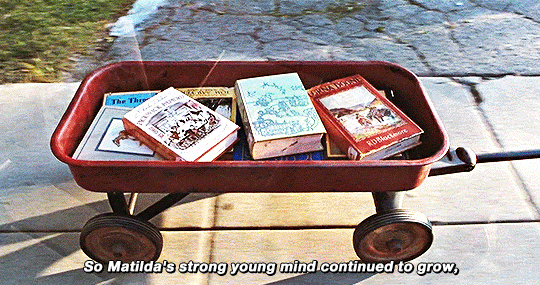

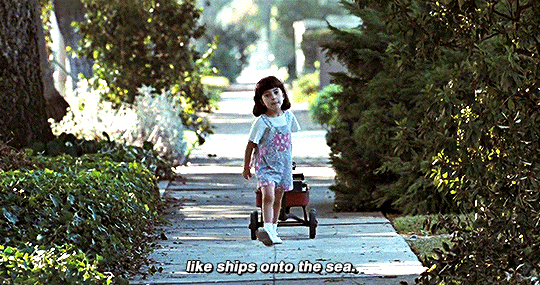
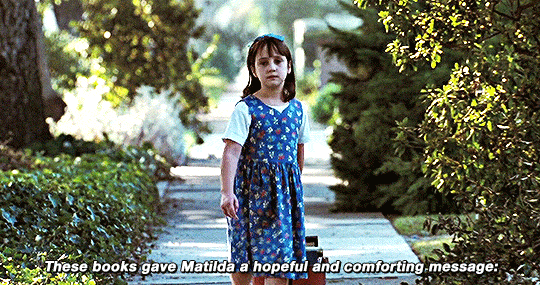

Matilda (1996), dir. Danny DeVito
An old and homely grandmother accidentally summons a demon. She mistakes him for her gothic-phase teenage grandson and takes care of him. The demon decides to stay at his new home.
just some little pride and prejudice (2005) things i love
the sense of chaotic female energy in the Bennet household
the sound of tinkling piano music and bird song and giggling
when Jane tries to pull a ‘not all men’ on Lizzy but Lizzy is havin none of it and calls all men humourless poppycocks
Lizzy’s satisfied smirk as she STRIDES away after sending mr darcy 2 his grave with ‘even if one’s partner is barely tolerable’
Lizzy and Jane giggling under the covers 😭
Mrs Bennet discussing Mr Bennets imposing death over the breakfast table and nobody bats an eyelid except to be like ‘its 10am’ like this obviously happens A Lot
And then Mr Bennet and lizzy joke about Jane dying like why does this Regency era family have the humour of millennials
when Darcy is listing all the things an accomplished woman should have and he says ‘she should expand her mind with extensive reading’ or w.e and lizzy SNAPS that book shut so fast
the Mrs Bennet Pig Testicle Scene Nobody Talks About
the hand
after Mr Collins proposal when Mrs Bennet goes to Mr Bennet for help and he’s just like up a ladder ? And all he does up there is pick up a pot plant? I’m thoroughly convinced he just climbed that ladder to avoid the drama ((he failed))
the dramatic ZOOM when Darcy bursts into the room just to stand around, make one line of polite conversation, and then leave
m not going to comment abt the rain scene bc theres too much to unpack but THE RAIN SCENE
‘He’s so. he’s so… he’s so RICH’ i feel u girl
The dreamy shots of Pemberley + dreamy music music layered with Darcy’s housekeeper saying lovely things about him like you know Lizzy was falling in love with him right then and there even tho he wasn’t even in the room
All the ripped statues probably help
Shame that the scene where Darcy sees Lizzy at Pemberly for the first time will be forever ruined because all i can hear in my head is RUN
Turns up in the middle of the night, invites self in, insults the size of the garden….. an icon
The fact that the entire Bennet family listening in to private conversations at the door is a recurring theme
“i love… i love… i love you”
the last scene of Lizzy and her dad laughing and crying at how in love she is is the goodest purest scene and in This House we don’t speak of the american alternate ending



This is important. The tone Crowley used. It’s like he’s ready to change the name the instant Aziraphale says he doesn’t.
-
 alovelyrat liked this · 1 month ago
alovelyrat liked this · 1 month ago -
 lessjucey liked this · 1 month ago
lessjucey liked this · 1 month ago -
 alexbarmen liked this · 1 month ago
alexbarmen liked this · 1 month ago -
 ajessi81 liked this · 1 month ago
ajessi81 liked this · 1 month ago -
 whatnext2020 reblogged this · 1 month ago
whatnext2020 reblogged this · 1 month ago -
 whatnext2020 liked this · 1 month ago
whatnext2020 liked this · 1 month ago -
 pookycreations reblogged this · 1 month ago
pookycreations reblogged this · 1 month ago -
 pluckyyoungdonna reblogged this · 1 month ago
pluckyyoungdonna reblogged this · 1 month ago -
 dragonnan reblogged this · 1 month ago
dragonnan reblogged this · 1 month ago -
 demetrakekka liked this · 1 month ago
demetrakekka liked this · 1 month ago -
 serpensortia06 reblogged this · 1 month ago
serpensortia06 reblogged this · 1 month ago -
 serpensortia06 liked this · 1 month ago
serpensortia06 liked this · 1 month ago -
 ineffableobikin liked this · 1 month ago
ineffableobikin liked this · 1 month ago -
 its-all-ineffable liked this · 1 month ago
its-all-ineffable liked this · 1 month ago -
 totallysilvergirl reblogged this · 1 month ago
totallysilvergirl reblogged this · 1 month ago -
 doctorcaseyholmes reblogged this · 1 month ago
doctorcaseyholmes reblogged this · 1 month ago -
 astudyintheburningofhearts liked this · 1 month ago
astudyintheburningofhearts liked this · 1 month ago -
 marieki reblogged this · 1 month ago
marieki reblogged this · 1 month ago -
 hedoesgreatthedemon reblogged this · 1 month ago
hedoesgreatthedemon reblogged this · 1 month ago -
 jawnn-watson reblogged this · 1 month ago
jawnn-watson reblogged this · 1 month ago -
 jawnn-watson liked this · 1 month ago
jawnn-watson liked this · 1 month ago -
 troublepunk-ldn liked this · 1 month ago
troublepunk-ldn liked this · 1 month ago -
 inevitably-ineffable-husbands reblogged this · 1 month ago
inevitably-ineffable-husbands reblogged this · 1 month ago -
 mytree1315 liked this · 1 month ago
mytree1315 liked this · 1 month ago -
 kristinsmindinpictures reblogged this · 1 month ago
kristinsmindinpictures reblogged this · 1 month ago -
 megsforeva1 liked this · 1 month ago
megsforeva1 liked this · 1 month ago -
 ttheatre-trashh reblogged this · 1 month ago
ttheatre-trashh reblogged this · 1 month ago -
 ttheatre-trashh liked this · 1 month ago
ttheatre-trashh liked this · 1 month ago -
 shapeshiftert-t liked this · 1 month ago
shapeshiftert-t liked this · 1 month ago -
 the-local-genderfluid-demon liked this · 1 month ago
the-local-genderfluid-demon liked this · 1 month ago -
 aziracrowschild liked this · 1 month ago
aziracrowschild liked this · 1 month ago -
 topsyturvy-turtely reblogged this · 1 month ago
topsyturvy-turtely reblogged this · 1 month ago -
 topsyturvy-turtely liked this · 1 month ago
topsyturvy-turtely liked this · 1 month ago -
 mostly-mortal liked this · 1 month ago
mostly-mortal liked this · 1 month ago -
 kristinsmindinpictures liked this · 1 month ago
kristinsmindinpictures liked this · 1 month ago -
 accraalex liked this · 1 month ago
accraalex liked this · 1 month ago -
 4buna1 liked this · 2 months ago
4buna1 liked this · 2 months ago -
 uhhhhidk116 liked this · 2 months ago
uhhhhidk116 liked this · 2 months ago -
 k1ttyc2tm2n liked this · 2 months ago
k1ttyc2tm2n liked this · 2 months ago -
 mikeyyikess reblogged this · 2 months ago
mikeyyikess reblogged this · 2 months ago -
 mikeyyikess liked this · 2 months ago
mikeyyikess liked this · 2 months ago -
 tricksterwolf10 liked this · 2 months ago
tricksterwolf10 liked this · 2 months ago -
 jamalexlee reblogged this · 3 months ago
jamalexlee reblogged this · 3 months ago -
 cynicalcrone liked this · 3 months ago
cynicalcrone liked this · 3 months ago -
 charles2468642 liked this · 3 months ago
charles2468642 liked this · 3 months ago -
 babybreaxxd liked this · 4 months ago
babybreaxxd liked this · 4 months ago -
 za1ka liked this · 4 months ago
za1ka liked this · 4 months ago -
 froglyberrys reblogged this · 4 months ago
froglyberrys reblogged this · 4 months ago -
 froglyberrys liked this · 4 months ago
froglyberrys liked this · 4 months ago
227 posts
